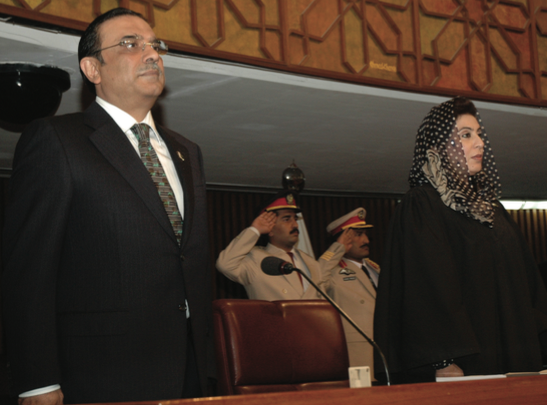In its urge to fight the forces of evil, Washington seems ready to dance with the devil in nuclear-armed Pakistan. In the latest chapter of a tragic political saga, Asif Ali Zardari was elected president on September 6, a feat welcomed by Condoleezza Rice as “a good way forward.” The US Secretary of State praised Zardari’s will to fight terrorism and his warm words of friendship towards the US.
Zardari’s affability towards the US should not come as a surprise. Were it not for Washington, the 53- year-old would still be behind bars. His resurrection at the helm of troubled Pakistan is the icing on the cake of a very colorful career and must go down in history as one of the most dramatic political comebacks ever.
Born in Karachi as the son of a wealthy businessman, Zardari’s path to glory started with his marriage to the late former Pakistani Prime Minister Benazir Bhutto. Prior to that, his name was featured as a polo-playing playboy in the local gossip pages. His (arranged) marriage to Bhutto was widely seen as one of mutual convenience. He had his father’s money, but no name. She could do with the money, while a husband on her side greatly advanced her political prospects in conservative Pakistan.
Widely known as “Mr. 10%,” Zardari owes his nickname to the hundreds of millions of dollars he allegedly received in kickbacks on major defense deals and privatization schemes completed during his wife’s reign. The money trail leads well beyond the Pakistani border, as Bhutto and Zardari own a string of bank accounts and houses around the world, including a nine- bedroom mansion, complete with an indoor swimming pool and helicopter landing pad, in Rockwood, UK.
While never formally convicted in Pakistan, a Swiss judge in 2003 ruled that Zardari and Bhutto had accepted $15 million in bribes from two Swiss firms. Bhutto however, appealed the verdict. In Britain, Lord Justice Collins judged that there was a “reasonable prospect” that the Pakistan government would be able to prove that Rockwood had been bought and furnished with “the fruits of corruption.”
Interestingly, Zardari only avoided an embarrassing appearance in British courts by claiming dementia. Fortunately, according to his doctor, his mind is working just fine again. A comforting thought, as Bhutto’s widower presides over a nation in great political and economic turmoil, as well as a big red button saying “Doomsday.”
Other serious accusations against Zardari include having attached a remote control bomb to the leg of a businessman to force him to pay his 10% and the 1996 murder of his brother in law, Murtaza Bhutto, who had openly humiliated Zardari and called for his resignation. Zardari spent a total of 11 years in jail. He was only released in 2004, thanks (indirectly) to a US-brokered power-sharing deal between Bhutto and former military leader Pervez Musharraf.
Until then, the US administration had firmly supported Musharraf, yet grew increasingly frustrated with the latter’s tactics on the North Western Frontier, where al-Qaeda and the Taliban have found refuge. Musharraf refused to send in the Pakistani army in an all- out assault and refused to let American soldiers operate on Pakistani soil. And so, Washington decided he had to go.
Gradually, Musharraf was no longer portrayed as a steadfast partner in the war against terror, but as the military dictator he had been all along. Back came the call for democracy. Back came Bhutto. Having been ignored for years, she was dusted off and saddled up for a glorious return to her native country. In return, she was said to be greatly concerned about the rise of Muslim extremism and the need to tackle the safe havens near the Afghan border, which was no doubt one reason for her assassination in late 2007, arguably on the orders of tribal leader Baitullah Mehsud.
Her death came hardly as a surprise for Musharraf, who knew all too well how unhealthy it is to be considered pro- American in Pakistan. Nicknamed “Busharraf,” he survived several assassination attempts. In addition, the ousted military leader was well aware that the Taliban were, to a large extent, created by the Pakistani army, elements of which do not want to see their baby thrown out with the bathwater.
Finally, a significant part of the Pakistani population support or sympathize with their Muslim brethren near and across the Afghani border. In short, taking on Pakistan’s western tribes is likely to lead to a stepped-up bombing campaign within Pakistan, which could threaten the state’s very survival.
Add to this the opportunist Zardari with his alleged taste for easy money. Officially, he is only a caretaker until his son graduates from Oxford, yet many fear he may prove unwilling to give up his seat. He is yet to abolish the extra powers Musharraf had created for the presidency and is yet to re-install Iftikhar Muhammad Chaudhry and other judges, who aimed to tackle the country’s abysmal corruption record. Many analysts fear that Pakistan got rid of military rule, only to get a civilian dictatorship in return.
Peter Speetjens is a Beirut-based journalist
























